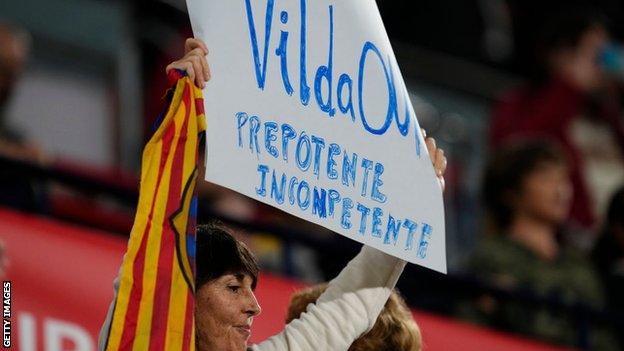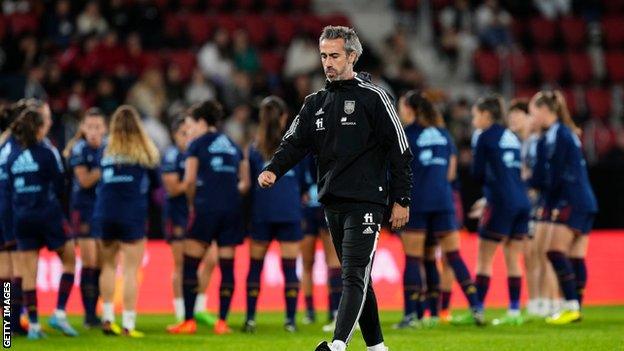Spain: Will damaging row have lasting consequences?
- Published

A Spain fan held a sign calling for the resignation of coach Jorge Vilda before their friendly victory over the USA
After winning the Women's Ballon d'Or for the second consecutive year on Monday, Spain midfielder Alexia Putellas was quickly brought down to earth with questions about the fallout which has left her national team in disarray.
"All I am going to say today about the national team is that obviously it is a topic that makes me very sad," the Barcelona captain said.
"I think it needs to be spoken about, but today is not the day. This is a day for celebration, a historic day, and that's all."
Last month, the Spanish Football Federation (RFEF) claimed 15 members of its national team had said they would resign unless head coach Jorge Vilda stepped down.
That was later denied by the players, who had been told they would not be selected for international duty unless they apologised.
Putellas, 28, who is currently sidelined with a serious knee injury, has previously expressed her support for those involved - which included Spain captain Irene Paredes, record scorer Jenni Hermoso and midfielder Aitana Bonmati, who placed fifth in this year's Ballon d'Or.
With only nine months until the 2023 Women's World Cup, BBC Sport takes a closer look at the explosive row which could have damaging consequences for women's football in Spain.
What are the main issues?
It is understood the players first raised concerns over training methods, inadequate game preparation and coaching decisions during Euro 2022, where the team reached the last eight before losing to eventual winners England.
Spanish journalist Maria Tikas, who writes for the country's daily newspaper Sport, told BBC Sport players believed "results in the last few years do not reflect the level of the team".
Since Vilda's appointment in 2015, Spain have failed to progress beyond the quarter-finals of a major tournament. They have won about 70% of their matches under Vilda.
At the same time the Barcelona team, made up of mainly Spanish players, have sparkled in club football, reaching successive Champions League finals.
Tikas said there was a general feeling in Spain among supporters and journalists that the "federation's commitment with women's football is not real and not enough".
"Players notice a lot of difference between training sessions with their clubs and the national team, as well as many practices to be 'inappropriate'," Tikas added.
"They didn't like that the federation renewed Vilda's contract until 2024 just a few days before the Euros. The message sent was that no matter what the result of the Euros was, Vilda would continue in charge."
Tikas believes there has been examples of players joining the national team and starting games after just recovering from injury - despite medical advice - and a lack of rotation affecting player welfare.
Will the situation improve before the World Cup?

Jennifer Hermoso (left), Aitana Bonmati (centre) and Alexia Putellas (right) are among the high-profile Barcelona players affected
Following statements from the RFEF and the players, Vilda told reporters: "I am deeply hurt. It's an unfair situation that nobody deserves. I think it's a ridicule on a global scale.
"This mess is hurting Spanish football. It's a worldwide embarrassment."
Hermoso later described the situation as the "worst moments in the history of women's football in Spain".
Vilda was forced to name a depleted squad for matches against Olympic finalists Sweden and world number one the USA in October, excluding 14 members from his previous selection. However, Spain still managed a 1-1 draw and a 2-0 win respectively.
Tikas said those results "benefit" Vilda and the new players.
Nine of the squad selected for those friendlies came from Real Madrid, and there have been suggestions a split exists between Barcelona and Real players, but Tikas does not believe that.
"There are players from Real Madrid that agree with them. However, they were told by their club to not be part of the group that sent the email and to go with the national team if they were called up," she added.
"I don't think it's a split between Barcelona and Real Madrid players, but it seems like that."
It is clear a division has emerged, however, between some of the players and the coaching staff and federation.
"The team that [played in] the last international window is good, but Vilda only trusts them because they are with him," said Tikas.
"Some of the players involved [Alexia Putellas, Jenni Hermoso and Irene Paredes] are some of the best players in their position. Of course not having them at the World Cup will harm Spain's chances."
Tikas said the situation is "unsustainable" and it is likely to come down to a choice by RFEF president Luis Rubiales on whether to back Vilda or the players.
"Rubiales will always choose Vilda before anyone else," said Tikas.
How much support is there for Vilda?

Jorge Vilda oversaw a draw against Sweden and victory over the USA in October
There was a positive reaction to Vilda's appointment in 2015 after 30 years under Ignacio Quereda, which led to players publicly voicing grievances against an alleged culture of fear and intimidation, external.
Vilda had success with Spain's youth teams, including two gold medals in the Women's U17 Euros, leading to a nomination for Fifa Coach of the Year in 2014.
However, Vilda had not managed a senior team prior to his appointment, and as the women's game grew in Spain Tikas said many began to consider whether he was "good enough to be in charge".
"The federation have so much confidence in him because he's really close to the president Rubiales, and he is also the sporting director of the RFEF women's national-team system," added Tikas.
The reaction to the current situation has been mixed in Spain, said Tikas, with many who had followed the team for years not surprised by the latest developments.
"I feel disappointed because this situation has come when Spanish women's football was at its best and it's definitely a step backward," she added.
"I see what England are doing and I feel envy.
"I feel that many changes should be made and players should always be listened to and their opinion taken into account.
"The players affected should have talked more and explained their reasons. They do not want to talk and I feel this is a mistake. A lot of media are just reporting one of the parts."
BBC Sport has contacted the RFEF for a response.

Do longer prison sentences reduce crime? Bad People goes in search of answers
A champagne lifestyle built on lies: The story of an intern who managed to con thousands of dollars
